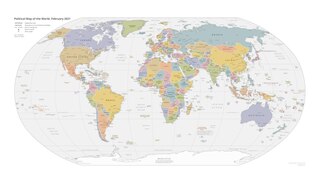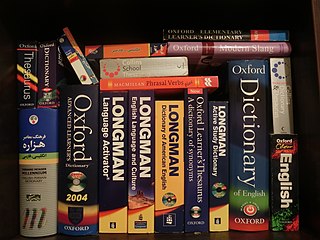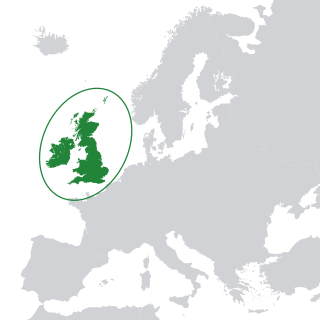American English, sometimes called United States English or U.S. English, is the set of varieties of the English language native to the United States. Currently, American English is the most influential form of English worldwide.
Australian English is the set of varieties of the English language native to Australia. Although English has no official status in the Constitution, Australian English is the country's national and de facto official language as it is the first language of the majority of the population.

The English language was first introduced to the Americas by British colonisation, beginning in the late 16th and early 17th centuries. The language also spread to numerous other parts of the world as a result of British trade and colonisation and the spread of the former British Empire, which, by 1921, included about 470–570 million people, about a quarter of the world's population. Written forms of British and American English as found in newspapers and textbooks vary little in their essential features, with only occasional noticeable differences.

A country is a distinct territorial body or political entity. It is often referred to as the land of an individual's birth, residence or citizenship.

A dictionary is a listing of words in one or more specific languages, often arranged alphabetically, which may include information on definitions, usage, etymologies, pronunciations, translation, etc. or a book of words in one language with their equivalents in another, sometimes known as a lexicon. It is a lexicographical reference that shows inter-relationships among the data.
North American English is the most generalized variety of the English language as spoken in the United States and Canada. Because of their related histories and cultures, plus the similarities between the pronunciation (accent), vocabulary, and grammar of American English and Canadian English, the two spoken varieties are often grouped together under a single category. Canadians are generally tolerant of both British and American spellings, with British spellings being favored in more formal settings and in Canadian print media.

Brightness is an attribute of visual perception in which a source appears to be radiating or reflecting light. In other words, brightness is the perception elicited by the luminance of a visual target. It is not necessarily proportional to luminance. This is a subjective attribute/property of an object being observed and one of the color appearance parameters of color appearance models. Brightness refers to an absolute term and should not be confused with lightness.

The International Radiotelephony Spelling Alphabet, commonly known as the NATO phonetic alphabet or the ICAO phonetic alphabet, is the most widely used radiotelephone spelling alphabet. The ITU phonetic alphabet and figure code is a variant.
Lord is an appellation for a person or deity who has authority, control, or power over others, acting like a master, a chief, or a ruler. The appellation can also denote certain persons who hold a title of the peerage in the United Kingdom, or are entitled to courtesy titles. The collective "Lords" can refer to a group or body of peers.

A sweater, also called a jumper in British English, is a piece of clothing, typically with long sleeves, made of knitted or crocheted material, that covers the upper part of the body. When sleeveless, the garment is often called a slipover or sweater vest.
Indian English (IE) is a class of varieties of the English language spoken in India, and among the Indian diaspora elsewhere in the world. English is used by the Indian government for some communication as a supplement to Hindi, the country's "official language of the Union" enshrined in the Constitution. English is an official language of 7 states and 5 Union Territories and also additional official language of 7 states and 1 Union Territory. English is also the sole official language of the Judiciary of India, unless a state Governor or legislature mandates the use of regional language, or the President has given approval for the use of regional languages in courts. Indian English originated from British English but is used by more people. In his book The English Language (1990) David Crystal observed, "British English is now, numerically speaking, a minority dialect, compared with American, or even Indian English."
A code name, call sign or cryptonym is a code word or name used, sometimes clandestinely, to refer to another name, word, project, or person. Code names are often used for military purposes, or in espionage. They may also be used in industrial counter-espionage to protect secret projects and the like from business rivals, or to give names to projects whose marketing name has not yet been determined. Another reason for the use of names and phrases in the military is that they transmit with a lower level of cumulative errors over a walkie-talkie or radio link than actual names.
This glossary of names for the British include nicknames and terms, including affectionate ones, neutral ones, and derogatory ones to describe British people, and more specifically English, Welsh, Scottish and Northern Irish people. Many of these terms may vary between offensive, derogatory, neutral and affectionate depending on a complex combination of tone, facial expression, context, usage, speaker and shared past history. When hearing British speakers talk amongst themselves it is wise not to assume that terms marked as offensive are being used as such however, just because the speakers use such terms amongst or about themselves, do not assume that the same words from others will be accepted in the same way.

The terminology of the British Isles refers to the words and phrases that are used to describe the geographical and political areas of the islands of Great Britain, Ireland and the smaller islands which surround them. The terms are often a source of confusion, partly owing to the similarity between some of the actual words used but also because they are often used loosely. Many of the words carry geographical and political connotations which are affected by the history of the islands.
Western Australian English is the English spoken in the Australian state of Western Australia (WA).
The following articles list English words that share certain features in common.
In parliamentary procedure, the verb to table has the opposite meaning in different countries:






